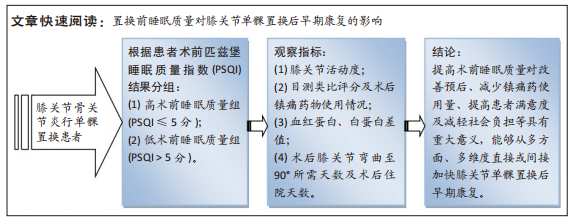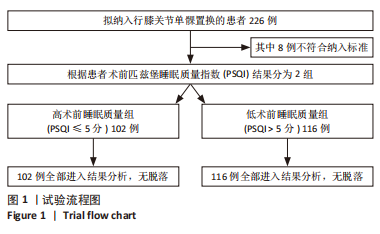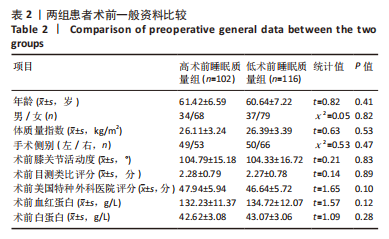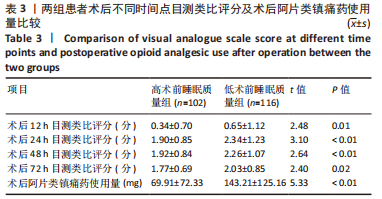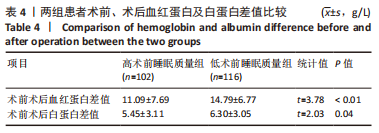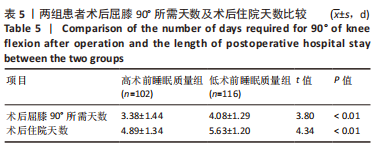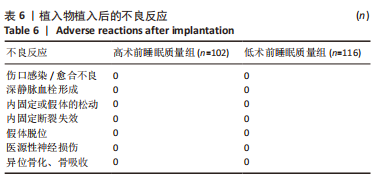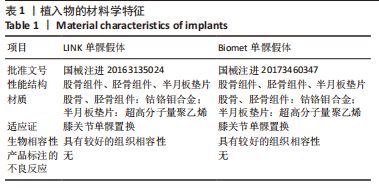[1] SNELL DL, DUNN JA, JERRAM KAS, et al. Associations between comorbidity and quality of life outcomes after total joint replacement. Qual Life Res. 2021;30(1):137-144.
[2] CANOVAS F, DAGNEAUX L. Quality of life after total knee arthroplasty. Orthop Traumatol Surg Res. 2018;104(1S):S41-S6.
[3] 赵中溢, 李勇阵, 陈峰,等.同期双侧全膝关节置换和单髁置换治疗创伤性关节炎的比较[J]. 中国组织工程研究,2021,25(6):854-859.
[4] PONGCHAROEN B, TIMJANG J. The outcomes of mobile bearing unicompartmental knee arthroplasty and total knee arthroplasty on anteromedial osteoarthritis of the knee in the same patient. Arch Orthop Trauma Surg. 2020;140(11):1783-1790.
[5] LYONS MC, MACDONALD SJ, SOMERVILLE LE, et al. Unicompartmental versus total knee arthroplasty database analysis: is there a winner? Clin Orthop Relat Res. 2012;470(1):84-90.
[6] KAHLENBERG CA, RICHARDSON SS, GRUSKAY JA, et al. Trends in Utilization of Total and Unicompartmental Knee Arthroplasty in the United States. J Knee Surg. 2021;34(10):1138-1141.
[7] HANSEN EN, ONG KL, LAU E, et al. Unicondylar Knee Arthroplasty in the U.S. Patient Population: Prevalence and Epidemiology. Am J Orthop (Belle Mead NJ). 2018;47(12) . doi: 10.12788/ajo.2018.0113.
[8] IRWIN MR. Why Sleep Is Important for Health: A Psychoneuroimmunology Perspective. Ann Rev Psychol. 2015;66(1):143-172.
[9] NOWAKOWSKI S, LEVY-MEEKS ME, DAWSON DB, et al. Association of preoperative sleep pattern with posthysterectomy pain: a pilot study. J Clin Sleep Med. 2020;16(11):1901-1908.
[10] DOLAN R, HUH J, TIWARI N, et al. A prospective analysis of sleep deprivation and disturbance in surgical patients. Ann Med Surg (Lond). 2016;6:1-5.
[11] IMERI L, OPP MR. How (and why) the immune system makes us sleep. Nat Rev Neurosci. 2009;10(3):199-210.
[12] MORGAN D, TSAI SC. Sleep and the endocrine system. Crit Care Clin. 2015;31(3):403-418.
[13] DESBOROUGH JP. The stress response to trauma and surgery. Br J Anaesth. 2000;85(1):109-117.
[14] MOOTE CA, KNILL RL. Isoflurane anesthesia causes a transient alteration in nocturnal sleep. Anesthesiology. 1988;69(3):327-331.
[15] DIMSDALE JE, NORMAN D, DEJARDIN D, et al. The effect of opioids on sleep architecture. J Clin Sleep Med. 2007;3(1):33-36.
[16] CHOUCHOU F, KHOURY S, CHAUNY JM, et al. Postoperative sleep disruptions: a potential catalyst of acute pain? Sleep Med Rev. 2014;18(3):273-282.
[17] BJURSTROM MF, IRWIN MR. Perioperative Pharmacological Sleep-Promotion and Pain Control: A Systematic Review. Pain Pract. 2019;19(5):552-569.
[18] BJURSTROM MF, IRWIN MR, BODELSSON M, et al. Preoperative sleep quality and adverse pain outcomes after total hip arthroplasty. Eur J Pain. 2021;25(7):1482-1492.
[19] KRENK L, JENNUM P, KEHLET H. Activity, Sleep and Cognition After Fast-Track Hip or Knee Arthroplasty. J Arthroplasty. 2013;28(8):1265-1269.
[20] KRENK L, JENNUM P, KEHLET H. Sleep disturbances after fast-track hip and knee arthroplasty. Br J Anaesth. 2012;109(5):769-775.
[21] BUYSSE DJ, REYNOLDS CF, 3RD, MONK TH, et al. The Pittsburgh Sleep Quality Index: a new instrument for psychiatric practice and research. Psychiatry Res. 1989;28(2):193-213.
[22] HAWKER GA, MIAN S, KENDZERSKA T, et al. Measures of adult pain: Visual Analog Scale for Pain (VAS Pain), Numeric Rating Scale for Pain (NRS Pain), McGill Pain Questionnaire (MPQ), Short-Form McGill Pain Questionnaire (SF-MPQ), Chronic Pain Grade Scale (CPGS), Short Form-36 Bodily Pain Scale (SF-36 BPS), and Measure of Intermittent and Constant Osteoarthritis Pain (ICOAP). Arthritis Care Res (Hoboken). 2011;63 Suppl 11(S11):S240-252.
[23] BOURNE RB, CHESWORTH BM, DAVIS AM, et al. Patient satisfaction after total knee arthroplasty: who is satisfied and who is not? Clin Orthop Relat Res. 2010;468(1):57-63.
[24] BJURSTROM MF, IRWIN MR. Polysomnographic characteristics in nonmalignant chronic pain populations: A review of controlled studies. Sleep Med Rev. 2016;26:74-86.
[25] FINAN PH, GOODIN BR, SMITH MT. The association of sleep and pain: an update and a path forward. J Pain. 2013;14(12):1539-1552.
[26] PARMELEE PA, TIGHE CA, DAUTOVICH ND. Sleep disturbance in osteoarthritis: linkages with pain, disability, and depressive symptoms. Arthritis Care Res (Hoboken). 2015;67(3):358-365.
[27] FISHBAIN DA, COLE B, LEWIS JE, et al. What Is the Evidence for Chronic Pain Being Etiologically Associated with the DSM-IV Category of Sleep Disorder Due to a General Medical Condition? A Structured Evidence-Based Review. Pain Med. 2010;11(2):158-179.
[28] AFOLALU EF, RAMLEE F, TANG NKY. Effects of sleep changes on pain-related health outcomes in the general population: A systematic review of longitudinal studies with exploratory meta-analysis. Sleep Med Rev. 2018;39:82-97.
[29] SMITH MT, QUARTANA PJ, OKONKWO RM, et al. Mechanisms by which sleep disturbance contributes to osteoarthritis pain: a conceptual model. Curr Pain Headache Rep. 2009;13(6):447-454.
[30] DZIERZEWSKI JM, WILLIAMS JM, RODITI D, et al. Daily variations in objective nighttime sleep and subjective morning pain in older adults with insomnia: evidence of covariation over time. J Am Geriatr Soc. 2010;58(5):925-930.
[31] AFFLECK G, URROWS S, TENNEN H, et al. Sequential daily relations of sleep, pain intensity, and attention to pain among women with fibromyalgia. Pain. 1996;68(2):363-368.
[32] NASCIMENTO DC, ANDERSEN ML, HIPOLIDE DC, et al. Pain hypersensitivity induced by paradoxical sleep deprivation is not due to altered binding to brain mu-opioid receptors. Behav Brain Res. 2007;178(2):216-220.
[33] HAACK M, SCOTT-SUTHERLAND J, SANTANGELO G, et al. Pain sensitivity and modulation in primary insomnia. Eur J Pain. 2012;16(4):522-533.
[34] SMITH MT, EDWARDS RR, MCCANN UD, et al. The effects of sleep deprivation on pain inhibition and spontaneous pain in women. Sleep. 2007;30(4):494-505.
[35] RICHEBE P, CAPDEVILA X, RIVAT C. Persistent Postsurgical Pain: Pathophysiology and Preventative Pharmacologic Considerations. Anesthesiology. 2018;129(3):590-607.
[36] SHIMONY N, AMIT U, MINZ B, et al. Perioperative pregabalin for reducing pain, analgesic consumption, and anxiety and enhancing sleep quality in elective neurosurgical patients: a prospective, randomized, double-blind, and controlled clinical study. J Neurosurg. 2016;125(6):1513-1522.
[37] KEHLET H. Multimodal approach to control postoperative pathophysiology and rehabilitation. Br J Anaesth. 1997;78(5):606-617.
[38] MOLKO S, COMBALIA A. La cirugía de recuperación rápida en las artroplastias de rodilla y cadera. Una actualización. Revista Española de Cirugía Ortopédica y Traumatología. 2017;61(2):130-138.
[39] CHUA MJ, HART AJ, MITTAL R, et al. Early mobilisation after total hip or knee arthroplasty: A multicentre prospective observational study. PLOS ONE. 2017;12(6):e0179820.
[40] BRACEY DN, HEGDE V, POLLET AK, et al. Incidence and Predictive Risk Factors of Postoperative Urinary Retention After Primary Total Knee Arthroplasty. J Arthroplasty. 2021;36(7):S345-S350.
[41] HEYMANS MJLF, KORT NP, SNOEKER BAM, et al. Impact of enhanced recovery pathways on safety and efficacy of hip and knee arthroplasty: A systematic review and meta-analysis. World J Orthop. 2022;13(3):307-328.
[42] LI R, CHEN N, WANG E, et al. Correlation between preoperative sleep disorders and postoperative delayed neurocognitive recovery in elderly patients. Zhong Nan Da Xue Xue Bao Yi Xue Ban. 2021;46(11):1251-1259.
[43] LAM EWK, CHUNG F, WONG J. Sleep-Disordered Breathing, Postoperative Delirium, and Cognitive Impairment. Anesth Analg. 2017;124(5):1626-1635.
[44] O’GARA BP, GAO L, MARCANTONIO ER, et al. Sleep, Pain, and Cognition: Modifiable Targets for Optimal Perioperative Brain Health. Anesthesiology. 2021;135(6):1132-1152.
[45] COHEN SP, VASE L, HOOTEN WM. Chronic pain: an update on burden, best practices, and new advances. Lancet. 2021;397(10289):2082-2097.
|
